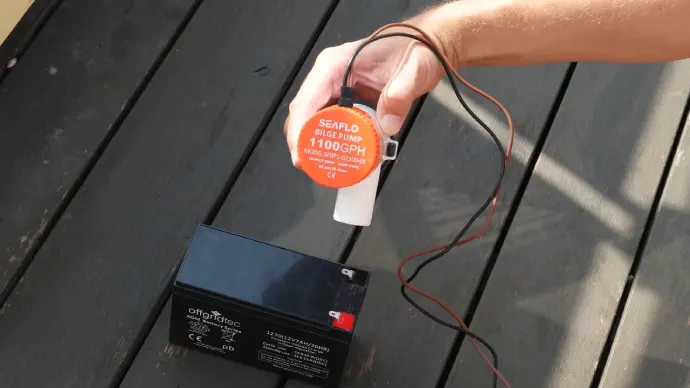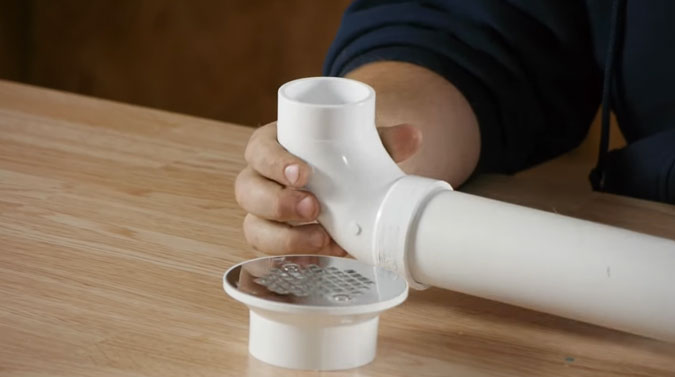Last Updated on May 23, 2023
Water damage is never a pleasant experience in any basement or crawl space. As a homeowner, you may have installed an inexpensive bilge pump in your basement to remove excess water. These pumps are incredibly beneficial in keeping your basement dry, but you must understand how to use them properly.
Continuously leaving the bilge pump on can damage the motor impeller, leading to pump failure. Therefore, you must switch off the manual bilge pump once the water has been removed. Also, most bilge pumps are not designed for continuous operation. Their lifespan is short, and they’re meant for intermittent use.
Today we will discuss whether or not you should leave your bilge pump on continuously or if it’s better to switch it off once the water is pumped out. Keep reading to learn more about bilge pumps to dry your basement.
Why Should You Never Leave a Bilge Pump Power On?

A bilge pump is a critical part of your home’s drainage system. It helps remove excess water from your basement or crawl space. But leaving a bilge pump on for prolonged periods (or dry) can cause severe damage, such as:
Can Damage the Motor Impeller
Bilge pumps have an impeller responsible for pumping water out of your house basement or crawl space. However, when the pump runs for extended periods, the impeller can get damaged, leading to reduced efficiency.
When the impeller is broken, it will not work at optimum levels, meaning the manual pump will have to work harder to remove water from your home’s basement or crawl space. As a result, its lifespan will be reduced, and you may have to replace it sooner than expected.
Leading to Pump Failure
As noted above, leaving a bilge pump on for extended periods can cause the impeller to get damaged. In severe cases, this can lead to pump failure, which can be disastrous for your home’s basement or crawl space.
Also, continuous use can cause the motor to overheat, leading to an electrical short or a blown fuse. This can also result in costly repairs or pump replacement.
With a failed pump, excess water will accumulate in your home’s basement, leading to flooding, water damage, and potential mold growth. Moreover, a failed pump will force you to incur additional repair and replacement costs, which can be expensive.
Increased Risk of Electrical Fires
Never leave a bilge pump on for longer periods, as doing so can cause it to overheat and increase the risk of electrical fires. Bilge pumps are electrical devices that draw power from your home’s electrical system.
When left on for extended periods, they can generate excessive heat, which can cause electrical wires to overheat and potentially catch fire. You could lose a lot of money and damage your home if you have an electrical fire.
Increased Energy Costs
Finally, leaving your bilge pump power on for extended periods will lead to higher energy costs. Bilge pumps consume a significant amount of energy, and when left on for long periods, they can contribute significantly to your home’s electricity bill.
Besides, the more they work, the higher the risk of wear and tear, thus forcing you to replace them earlier, leading to additional costs.
How to Care for Your Basement Bilge Pump?

Basement bilge pumps can benefit homes with a basement, but maintenance is required to ensure the pump functions efficiently and effectively. Here are some tips to follow to take care of your bilge pump:
Regular Inspection
Regular inspections of your basement bilge pump help detect any potential problems with the machine. We recommend a monthly inspection where you check the pump for any signs of wear and tear, unusual sounds, or vibrations and ensure it is firmly attached to its base.
Keeping the Pump Area Clean
Debris and dirt accumulating around the pump can cause blockages that inhibit its ability to function efficiently. Therefore, it is vital to regularly clean the area surrounding the pump, removing any debris, sand, or soil.
Checking the Float Switch
The float switch is an essential component in your basement bilge pump that turns it on and off. Conduct regular inspections to ensure the float switch is free of obstructions and the wires are well-connected to the primary electricity source.
Checking the Discharge Pipe
Check the discharge pipe regularly. Examine the pipe for clogs and ensure it directs the water to the correct drainage point. If you find any clogs, clear them by removing any debris, silt, or blockages. Also, check any cracks or leaks in the pipe and repair them immediately to avoid water damage.
Is it wrong to run a bilge pump dry?
Running a bilge pump dry can have damaging effects on the impeller. As the motor continues to run without water to cool and lubricate the impeller, it can cause it to overheat, warp, or crack. This can result in costly repairs or even the need for a replacement pump.
Therefore, it is crucial to ensure that the bilge pump is always submerged in water to prolong its lifespan and prevent unnecessary damage.
Can a bilge pump run 24/7?
It is not recommended to run a bilge pump continuously 24/7. The bilge pump should only operate intermittently as the water level exceeds the recommended level.
While it is important to keep the pump functional in case of emergencies, running it constantly can lead to overheating and damage to the motor. Moreover, the constant operation can significantly increase the pump’s energy consumption, leading to higher electricity bills.
Will running the basement bilge pump drain the backup battery?
Running the basement bilge pump can sometimes drain the backup battery if the automatic switch fails to shut off the pump. As a result, the bilge pump motor can continue to run even after the water level has lowered, which can result in battery drainage.
To avoid this, it is essential to check the bilge pump regularly, ensure that the automatic switch is functioning correctly, and install a battery backup system that can handle the power needs of the bilge pump.
How long can I run a bilge pump continuously?

A bilge pump can run continuously over multiple 24-hour periods, but never let it run dry. Always ensure the pump is submerged in water to avoid mechanical damage to the motor. However, it is recommended to operate the pump intermittently by setting it to a low-duty cycle.
Also, regular maintenance and inspections can prolong the lifespan of the bilge pump, ensuring it continues to operate efficiently and effectively in an emergency.
Will leaving the bilge pump running result in excessive noise?
Leaving the bilge pump on for an extended period may result in excessive noise. Bilge pumps can produce noise when operating, resembling a low hum or whirring sound. But, prolonged operation can lead to increased vibration, leading to a loud, disruptive noise.
Factors such as the type of pump, its age, and the condition of the mounting can all contribute to the noise level. In some cases, debris or air bubbles can also cause the pump to become noisy.
Therefore, it is essential to monitor the bilge pump’s noise level regularly and address any issues promptly, such as cleaning or repairing the pump or securing the mounting. Regular maintenance and care can minimize excessive noise and prolong the bilge pump’s lifespan.
Safeguard Your Basement with Smart Bilge Pump Use
A manual bilge pump is an excellent tool for keeping your basement dry; however, it’s essential to use it correctly to avoid any potential damage to the pump. Leaving it on can cause serious damage to the motor impeller, decrease the pump’s lifespan, increase your electricity bill, and lead to costly replacements.
Turning off the bilge pump when the water has been pumped out is highly recommended to prevent motor impeller damage and maximize lifespan.
If you need help with the proper use of your bilge pump or how to take care of it, it’s always best to consult with a professional plumber to ensure the safety of your home.


